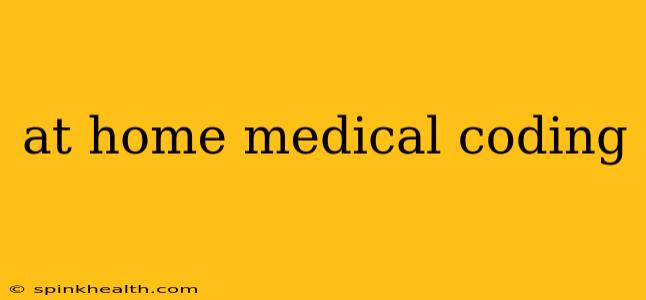The click-clack of keys, the quiet hum of your computer, the satisfying feeling of accomplishment – this could be your workday reality as a medical coder working from home. The rise of remote work has opened doors to countless careers, and medical coding is no exception. But is it as simple as it sounds? Let's dive into the world of at-home medical coding and uncover the realities, the challenges, and the rewards of this increasingly popular profession.
What is Medical Coding?
Imagine being the translator between doctors, hospitals, and insurance companies. That's essentially the role of a medical coder. We take complex medical diagnoses, procedures, and services and convert them into standardized alphanumeric codes using systems like ICD-10 (International Classification of Diseases, 10th Revision) and CPT (Current Procedural Terminology). These codes are the language of healthcare billing, ensuring accurate reimbursement for medical services.
Can I Really Code Medically From Home?
Absolutely! Many medical coding jobs are now fully remote, offering the flexibility and work-life balance that many crave. However, this flexibility comes with responsibilities. You'll need self-discipline, a dedicated workspace, and reliable internet access to succeed.
What Skills Do I Need for At-Home Medical Coding?
Beyond a keen eye for detail and a knack for numbers, successful at-home medical coders possess these essential skills:
- Medical Terminology Knowledge: Understanding medical terms is crucial for accurate coding.
- Anatomy and Physiology: A basic grasp of the human body is vital for interpreting medical reports.
- ICD-10 and CPT Coding Systems: Proficiency in these coding systems is paramount.
- Computer Skills: You'll be spending a lot of time on a computer, so strong computer skills are a must.
- Attention to Detail: Accuracy is crucial; even a small mistake can lead to incorrect billing.
- Time Management: Working from home requires strong self-discipline and time management skills.
How Do I Get Started with At-Home Medical Coding?
The journey to becoming a successful at-home medical coder usually involves:
- Education and Training: Consider earning a medical coding certification or associate's degree. Many online programs are available.
- Gaining Experience: Internships, volunteer work, or entry-level positions can provide valuable experience.
- Building Your Network: Connect with medical coding professionals online and in your community.
- Job Search: Search for remote medical coding jobs on job boards and company websites.
How Much Can I Earn as an At-Home Medical Coder?
Salaries for medical coders vary based on experience, location, and employer. However, you can expect a competitive salary, with opportunities for growth and advancement.
What are the Challenges of At-Home Medical Coding?
While working from home offers flexibility, it's not without challenges:
- Isolation: Working alone can be isolating, so building a supportive network is crucial.
- Maintaining Focus: Distractions at home can impact productivity, requiring strong self-discipline.
- Technology Issues: Reliable internet and computer equipment are essential for successful remote work.
Are There Different Types of At-Home Medical Coding Jobs?
The possibilities are diverse! You might find yourself coding for:
- Hospitals: Working remotely for a hospital system.
- Physician Practices: Supporting individual doctors or clinics.
- Insurance Companies: Processing claims for an insurance provider.
- Medical Billing Companies: Working for a company that specializes in medical billing.
Is Medical Coding a Good Career Choice?
For those who enjoy detail-oriented work, have a passion for healthcare, and thrive in a flexible work environment, at-home medical coding can be a tremendously rewarding career. The demand for skilled medical coders is high, and the opportunity to work remotely makes it an attractive option for many. But remember, success requires dedication, continuous learning, and a commitment to accuracy. The rewards—both financial and personal—can be significant.

